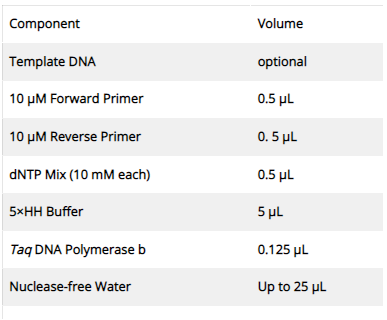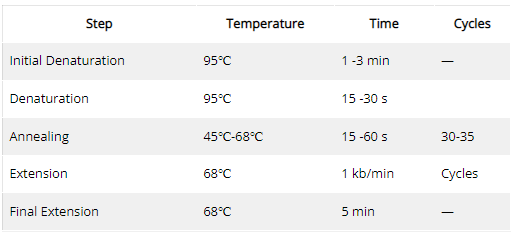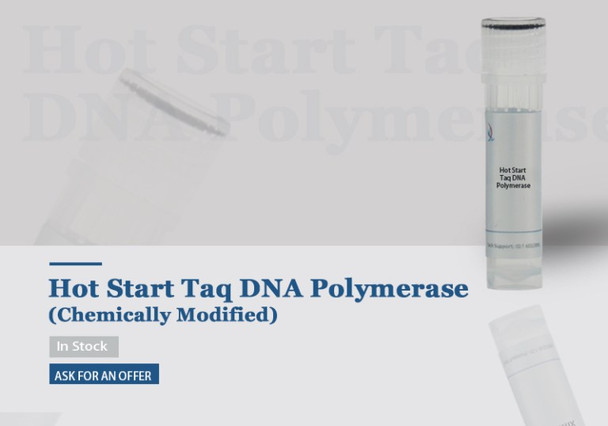Description
Product information

Description
Hot Start Taq DNA Polymerase ( Chemical modification ) is a hot-start thermostable DNA polymerase from Thermus aquaticus YT-1, which possesses a 5´→ 3´ polymerase activity and a 5´ flap endonuclease activity. The Hot Start Taq DNA polymerase is chemically modified from Taq DNA polymerase, to increase specificity, sensitivity, and yield.
Storage and transportation: Storage at -20℃ and transportation≤0℃
Supplied in: 10 mM Tris-HCl (pH 8.0)
at 25℃), 100 mM KCl, 0.1 mM EDTA, 1 mM dithiothreitol, 0.5% Tween20, 0.5% IGEPAL CA-630 and 50% Glycerol.
Unit definition: One unit is defined as the amount of enzyme that will incorporate 15 nmol of dNTP into acid-insoluble material in 30 minutes at 75°C.
Quality Control Assays
- Endonuclease Activity: Incubation of 20 U of the enzyme with 4 μg pUC19 DNA for 4 hours at 37°C resulted in no detectable degradation of the DNA as determined by gel electrophoresis.
- 5 kb Lambda PCR: 25 Cycles of PCR amplification of 5 ng Lambda DNA with 1.25 units of Taq DNA Polymerase in the presence of 200 µM dNTPs and 0.2 µM primers results in the expected 5 kb product.
- Exonuclease Activity: Incubation of a 50 µL reaction containing a minimum of 12.5 U of Taq DNA Polymerase with 10 nM 5´- FAM oligonucleotide for 30 minutes at 37℃ yields no detectable degradation.
- RNase Activity: Incubation of a 10 µL reaction containing 20 U of enzyme with 1 μg of RNA transcripts for 2 hours at 37°C resulted in no detectable degradation of the RNA as determined by gel electrophoresis.
Heat Inactivation: None.
Reaction setup:

a:

b:The optimal concentration of Taq DNA Polymerase may range from 5-50 units/mL (0.1-0.5 units/25 µL reaction) in specialized applications.
Thermocycling Conditions for a Routine 3-Step PCR:

a: An initial denaturation of 1min at 95 °C is sufficient for most amplicons. For complex templates, a longer denaturation of 2–3 min at 95°C is recommended. For colony PCR, an initial 5 min denaturation at 95 °C is recommended.
b: The annealing step is typically 15–60 s. The annealing temperature is based on the Tm of the primer pair and is typically 45–68℃.






